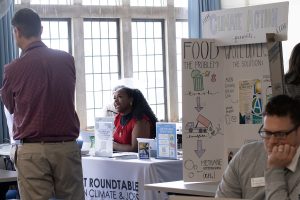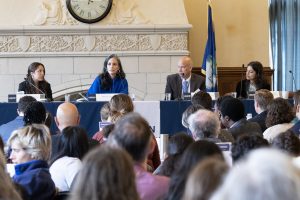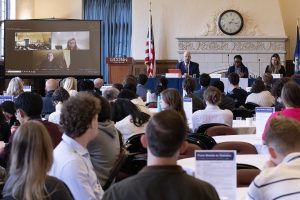UConn Law 2024 Earth Day Conference Explores Climate Activism and the Law
“What can we do?” was a recurring question at the 2024 UConn School of Law Earth Day Conference, which included panels of experts discussing aspects of the climate crisis ranging from education and environmental justice to children’s rights and local and international activism.
The conference, held on April 19, also included an activism fair where local environmental organizations presented information about their efforts to help connect with attendees interested in getting involved and taking action.
In light of troubling climate-related news, such as the realization that we now are in uncharted territory for climate models after the anomalously hot year of 2023, the economic damage caused by climate change could top 38 trillion dollars per year globally by 2050, and average sea surface temperatures set a new record high in March, the conference served as a reminder that many people are working to ensure a sustainable and habitable future.
The conference was organized by a dedicated group of law students, including J.D. Candidate Colleen Olsen ‘24, who said the process started last September.
“Planning something like this takes vision, collaboration, creativity, and generosity of spirit, which this group had in abundance,” Olsen said after the conference. “I also loved how this group was firmly dedicated to the idea of centering youth and activist voices, and to making our conference demonstrate the work of climate activism, as opposed to just hosting people talking about it. We wanted to show our attendees what real organizers are doing right here in our backyards, and to provide them with concrete opportunities to get involved – one group was even running a phone bank from the back of the room!”

Professor-in-Residence and Executive Director of the Center for Energy and Environmental Law Joseph MacDougald opened the conference by reminding the audience that activism makes a difference in working toward a more just and sustainable future. The subject of the conference – From Streets to Statutes: Climate Activism and the Law – is especially poignant now, as free speech and climate activism are under threat across the globe.
The first panel, moderated by UConn School of Law J.D. Candidate Madison Schettler, focused on advocacy, direct action, and education. Schettler discussed her experiences working with activists, and how the majority have been young people, which makes sense, she said, as they are growing up amid the climate crisis and will be instrumental in making change for a sustainable future.
The panel featured Aoife Daly, Professor at University College Cork; Professor Mia Montoya Hammersley from the Vermont Law and Graduate School; and Professor Sarah Stapleton from the University of Oregon. The panelists discussed the importance of youth activism and how vital climate change education is. Stapleton talked about youth-driven, grassroots efforts to empower teachers and ensure climate change education materials are readily available to teachers in the state of Oregon, how other states like New Jersey have mandated climate change education in all disciplines in their states, and how Connecticut is moving in the same direction.
Hammersley spoke about how lawyers can support and advocate for activists on the front lines, drawing from her experiences with movements such as Stop Cop City and Stop Line 3. Daly spoke about children’s rights and how they impact climate and environmental justice efforts. The panelists also discussed how children are disproportionately affected by climate change, including impacts on their mental health, and child activists who are claiming their rights are doing so at the expense of their childhoods.
The second panel was moderated by Professor Camila Bustos from Pace University and focused on aspects of local activism.
“Climate change is the defining challenge of our time, and we have the tools we have to address the challenge, including litigation, storytelling, and organizing,” Bustos said. “Law schools have an important role, because the law can be a barrier or a leverage point to help movements. There are opportunities and challenges ahead.”

The panel included Naina Agrawal-Hardin, a youth activist and student at Yale University; activist and Director of Brand Strategy & Partner at La Diáspora Bruni Pizzaro; and Senior Legal Director at Save the Sound and Adjunct Professor at the UConn School of Law Roger Reynolds. Agrawal-Hardin spoke about her experiences organizing with the Sunrise Movement and how lawyers can take many roles and help in a variety of interventions to help a movement, some as simple as making sure protesters are aware of their rights. Reynolds spoke about how intertwined environmental justice issues are within local contexts, specifically speaking about a local power plant and its impact on air quality for surrounding communities. Pizzaro spoke about how her experience helping her father organize a tenant strike informed her activism and work as a student at Yale studying the housing crisis and environmental refugees in New Haven from Puerto Rico following Hurricane Maria.
UConn Law student Brynn Furey was the lead organizer for the Climate Activism Fair, which included environmental advocacy groups and student groups from local schools. Throughout the day, conference attendees were invited to walk through the Fair, chat with organizers, and take action,
“Rather than simply talking about climate activism all day, we wanted to give our guests an opportunity to meet and support real activists who are leading the charge for a better future. We were able to do that through the Climate Activism Fair,” said Furey.
The keynote was given by David Wallace-Wells, climate journalist at the New York Times and author of the best-selling “The Uninhabitable Earth” (2019). Wallace-Wells opened by speaking about how fast things have changed since he finished his book, which was before Greta Thunberg was widely known, before Extinction Rebellion, and before the Sunrise Movement. He spoke about how these activists have helped shape and push for political and social change, and how in that time, things like the worst-case climate scenarios have also shifted, for the better.

“Millions protested, talked, and took action to bend the curve downward. Millions have taken notice and surely activism played a role,” said Wallace-Wells.
Wallace-Wells noted that though these are promising trends that have taken hold in a relatively short time, there must also be awareness of legal crackdowns on protest and the growing cultural impatience with activists, but that protest is effective in spreading awareness.
“There are inevitable impacts that are locked in at this point,” he said. “The stakes are high. The climate crisis will require us to change how we do everything which is disruptive. We have to get used to disruption.”
The third panel, moderated by MacDougald, was focused on international activism and issues around climate from a multicontinental perspective, over time.
The panel speakers were all Martin-Flynn Global Law Faculty and included Professor Enam Antonio from the Ghana Institute of Management and Public Administration; Professor Eleonora Bottini from the Université de Caen Normandie France; Professor Dirk Hanschel from the Martin-Luther-Universität Halle-Wittenberg, Germany; and Professor Danielle Pamplona from the Pontifical Catholic University of Paraná, Brazil. The panelists spoke about significant recent and ongoing cases in their countries and the implications of legal precedents, including the recent case in the European Court of Human Rights ruling that citizens have the right to expect their governments will protect them against climate change. The panelists discussed the importance of considering multicontinental perspectives and different strategies and approaches used in these cases.
“It is easy to be depressed in climate policy,” said MacDougald. “Yet, there is always a positive spin. When policies fail, others will arise.”
Olsen reflected on the conference, and said she was proud of how everything came together.
“We were also proud of the diverse audience who showed up – this wasn’t your typical academic conference,” she said. “We had high school students standing up to ask powerful questions, and community activists sitting at tables and having conversations with academics and law students. Any event that brings together people of diverse identities is bound to result in learning – and that’s what the day was all about.”
The conference was organized by the hard work and collaboration of UConn Law students Pearl Addo, Ruairi Blevio, Victoria Carpenter, Brynn Furey, Claudius Karich, Colleen Olsen, Lily Pickett, Sabrina Regan, Madison Schettler, Josh Schneider, Florence Simon, and Bennet Wiese. If you are interested in getting involved with local environmental groups, you can connect with one of the organizations present at the Climate Activism Fair: Sierra Club Connecticut, Insure Our Future, Connecticut League of Conservation Voters, Nonprofit Accountability Group, Connecticut Roundtable for Climate and Jobs, Connecticut Environmental Rights Amendment, Fossil Fuel Free UConn, Citizens’ Climate Lobby, Avon High School Climate Action Club, Save the Sound, and Hartford International University for Religion & Peace.
Latest UConn Today
- Physics Professor Nora Berrah Elected to National Academy of SciencesBerrah is the fifth member of the UConn community to be elected to the selective national organization that works to advise the nation on issues relating to science and technology
- The Era of ‘No-Show’ Fees Is Here – and It’s Going to Cost You
- Celebrating UConn’s Class of 2024The newest alums take their place in a great tradition
- Neag School Class of 2024 Student Profile: Soribel Torres-Jimenez ’23 (ED)“After talking to UConn alumni, I was confident that the connections I would make within the Neag School would open many doors for me to continue learning beyond the classroom.”
- Neag School Class of 2024 Student Profile: Camille Terrell“Deep down, I always knew I would end up at UConn. ... As decision day approached, many of my high school teachers said graduating from the Neag School would set me above many other candidates and that districts look highly upon UConn grads.”
- Ask UConn Extension: Getting an Early Start on Spring GardensExperts from UConn Extension's Master Gardener team share words of wisdom to enhance your green thumb


